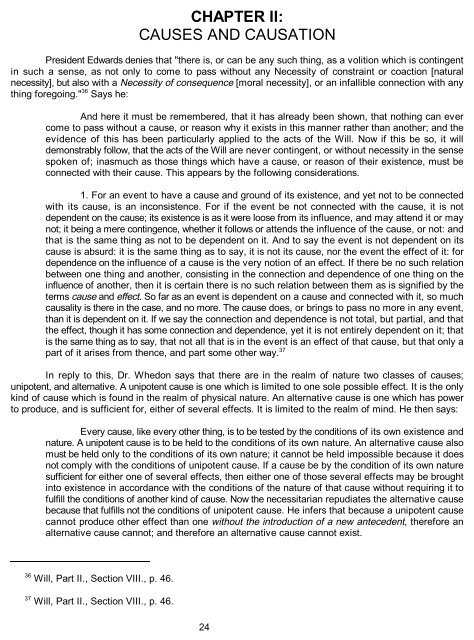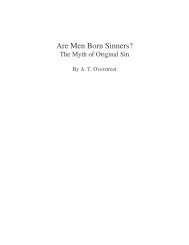Foreknowledge by Joel Hayes - Library of Theology
Foreknowledge by Joel Hayes - Library of Theology
Foreknowledge by Joel Hayes - Library of Theology
You also want an ePaper? Increase the reach of your titles
YUMPU automatically turns print PDFs into web optimized ePapers that Google loves.
36<br />
Will, Part II., Section VIII., p. 46.<br />
37<br />
Will, Part II., Section VIII., p. 46.<br />
CHAPTER II:<br />
CAUSES AND CAUSATION<br />
President Edwards denies that "there is, or can be any such thing, as a volition which is contingent<br />
in such a sense, as not only to come to pass without any Necessity <strong>of</strong> constraint or coaction [natural<br />
necessity], but also with a Necessity <strong>of</strong> consequence [moral necessity], or an infallible connection with any<br />
36<br />
thing foregoing." Says he:<br />
And here it must be remembered, that it has already been shown, that nothing can ever<br />
come to pass without a cause, or reason why it exists in this manner rather than another; and the<br />
evidence <strong>of</strong> this has been particularly applied to the acts <strong>of</strong> the Will. Now if this be so, it will<br />
demonstrably follow, that the acts <strong>of</strong> the Will are never contingent, or without necessity in the sense<br />
spoken <strong>of</strong>; inasmuch as those things which have a cause, or reason <strong>of</strong> their existence, must be<br />
connected with their cause. This appears <strong>by</strong> the following considerations.<br />
1. For an event to have a cause and ground <strong>of</strong> its existence, and yet not to be connected<br />
with its cause, is an inconsistence. For if the event be not connected with the cause, it is not<br />
dependent on the cause; its existence is as it were loose from its influence, and may attend it or may<br />
not; it being a mere contingence, whether it follows or attends the influence <strong>of</strong> the cause, or not: and<br />
that is the same thing as not to be dependent on it. And to say the event is not dependent on its<br />
cause is absurd: it is the same thing as to say, it is not its cause, nor the event the effect <strong>of</strong> it: for<br />
dependence on the influence <strong>of</strong> a cause is the very notion <strong>of</strong> an effect. If there be no such relation<br />
between one thing and another, consisting in the connection and dependence <strong>of</strong> one thing on the<br />
influence <strong>of</strong> another, then it is certain there is no such relation between them as is signified <strong>by</strong> the<br />
terms cause and effect. So far as an event is dependent on a cause and connected with it, so much<br />
causality is there in the case, and no more. The cause does, or brings to pass no more in any event,<br />
than it is dependent on it. If we say the connection and dependence is not total, but partial, and that<br />
the effect, though it has some connection and dependence, yet it is not entirely dependent on it; that<br />
is the same thing as to say, that not all that is in the event is an effect <strong>of</strong> that cause, but that only a<br />
part <strong>of</strong> it arises from thence, and part some other way. 37<br />
In reply to this, Dr. Whedon says that there are in the realm <strong>of</strong> nature two classes <strong>of</strong> causes;<br />
unipotent, and alternative. A unipotent cause is one which is limited to one sole possible effect. It is the only<br />
kind <strong>of</strong> cause which is found in the realm <strong>of</strong> physical nature. An alternative cause is one which has power<br />
to produce, and is sufficient for, either <strong>of</strong> several effects. It is limited to the realm <strong>of</strong> mind. He then says:<br />
Every cause, like every other thing, is to be tested <strong>by</strong> the conditions <strong>of</strong> its own existence and<br />
nature. A unipotent cause is to be held to the conditions <strong>of</strong> its own nature. An alternative cause also<br />
must be held only to the conditions <strong>of</strong> its own nature; it cannot be held impossible because it does<br />
not comply with the conditions <strong>of</strong> unipotent cause. If a cause be <strong>by</strong> the condition <strong>of</strong> its own nature<br />
sufficient for either one <strong>of</strong> several effects, then either one <strong>of</strong> those several effects may be brought<br />
into existence in accordance with the conditions <strong>of</strong> the nature <strong>of</strong> that cause without requiring it to<br />
fulfill the conditions <strong>of</strong> another kind <strong>of</strong> cause. Now the necessitarian repudiates the alternative cause<br />
because that fulfills not the conditions <strong>of</strong> unipotent cause. He infers that because a unipotent cause<br />
cannot produce other effect than one without the introduction <strong>of</strong> a new antecedent, therefore an<br />
alternative cause cannot; and therefore an alternative cause cannot exist.<br />
24






